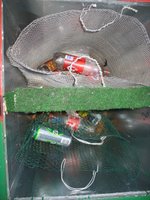
Let´s take good care of our rubbish
In our every day habits, throwing something in the garbage doesn´t demand any particular attention, it even embodies the typical gesture of carelessness. As soon as we decide that a draft paper, an empty can or a cigarette butt don´t have any utility, we feel we shouldn´t be connected with it anymore, we are even ashamed to keep it, waste are indeed dirty, ugly, possibly smelly, and useless. We have to get a rid of them, the sooner, no matter how, no matter where.
-BUT : by throwing rubbish wherever, we also throw our own responsability.
Rubbish won´t disappear on its own, it will stay where it was left and bears the gesture of the one who threw it.
- BUT : as long as there is matter, there is life.
the lifetime of a cigarette doesn´t stop once it is smoked, the plastic wrap still exists when you got what was inside. There is life before you get the rubbish ( people to make it, energy and materials to be spent and waste), and there is life after you throw it (people to pick up, collect and recycle, visitors to check if a place is clean or dirty...)
Why to recycle
- some ineresting figures :
for each ton of recycled cartboard, 2,5 tons of wood are saved.
Each sheet of paper that is reused allows to save 1 liter of water, 2,5Wh of electricity and 15g of wood. For one ton of recycled plastic, 700 Kg of crude petroleum are saved.
- BUT (nothing is perfect, there is always a but ) : recycling is very costing ( specially recycling glass), and is not enough to meet our fast growing release of waste. The first solution must be to produce less and less waste, thus to live a drastic change in our consumption habits.
The responsible consumer
- If we are responsible of throwing rubbish, we are also responsible of buying them.
Again, we can buy in conscience by choosing products according to some ecological labels, the quality, the quantity. And to buy consciously, we don´t only have to think how the product was made but how it was transported : a solid pack of laundry soap take less place than a drum of liquid soap, thus less trucks are recquired to freight them, thus less pollution... and lots of other exemples could be find. But this is a whole process of thinking we are not so used to when we enter a store. Buying is not enough thoughtfully connected. We all think about what we need and how to get it, but who would like to have a long and well balanced considering in front of the supermarket shelves when choosing a toothbrush...?
It´s all about changing our common perception and our every day habits, just thinking about it might be the first step.
- The cheaper doesn´t mean the most economical.
The price mustn´t be the only criteria when selecting a product, the quality and durability must be also considered. For instance, a fluocompact light bulb is 4 times more expensive than a normal one, but lasts 5 times longer and consumes a lot less energy.
A flat screen cost more than a normal one but use a lot less energy and has a better quality.
On the long term, we eventually save money and energy. It´s all about going further in reflection, having a look at the user guide, and again, taking a bit more time in the store, thus changing our habits...
recycling in the kreativni vrt
- as we noticed that the recycling initiative was not of the most effective, an idea was to add signs to inform about the meaning of recycling. Of course, all this moralistic bla bla wouldn´t be of any effect, we need a subversive way to render this task pleasant and concretly significant. Why not to highlight the "home made" recycling, like making ashtrays out of empty beer cans, wallets out of milk packs...
if you have any idea, skip to the section idejo so v zraku to add your comments.
No comments:
Post a Comment